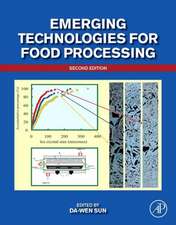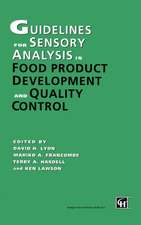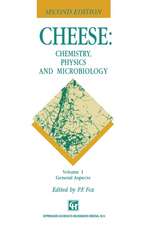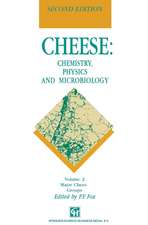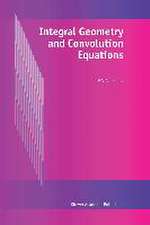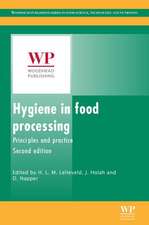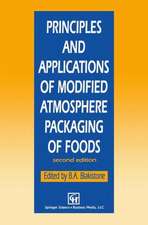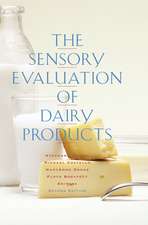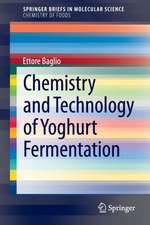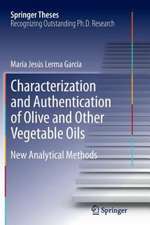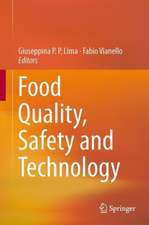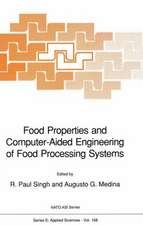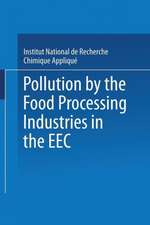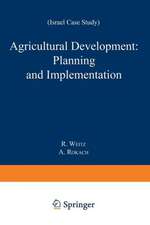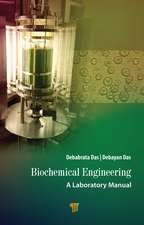Sequencing Technologies in Microbial Food Safety and Quality: Food Analysis & Properties
Editat de Devarajan Thangardurai, Leo M.L. Nollet, Saher Islam, Jeyabalan Sangeethaen Limba Engleză Hardback – 20 apr 2021
Molecular landscape for food safety analysis is rapidly revolutionizing because of high resolution and value added resulting analysis of NGS approaches. These modern sequencing technologies drive worldwide advancements in food safety and quality. Sequencing Technologies in Microbial Food Safety and Quality reviews several practices in that NGS contributes to foodborne pathogens functional characterization, management and control. This book focuses on potential uses of sequencing technologies in microbial food safety and quality, also highlighting present challenges in the food industry.
Key Features:
- Application of whole genome sequencing technologies in disease diagnostics, surveillance, transmission, and outbreak investigation in food sector
- Impact of sequencing tools in the area of food microbiology
- Recent advances in genomic DNA sequencing of microbial species from single cells
- Microbial bioinformatics resources for food microbiology
- High-throughput insertion tracking by deep sequencing for the analysis of food pathogens
This book includes contributions from experts who have manipulated sequencing tools in relation to microbial food safety and quality. Presenting comprehensive details about NGS approaches in food science, this book is an updated and reliable reference for food scientists, nutritionists, food product investigators to study and implement the sequencing technologies for development of quality and safe food. This book would also serve as informative resource for food industry officials, government researchers, food science or food nutrition department students who seek comprehensive knowledge about the role of emerging sequencing technologies in revolutionizing food industry.
| Toate formatele și edițiile | Preț | Express |
|---|---|---|
| Paperback (1) | 549.97 lei 6-8 săpt. | |
| CRC Press – 4 oct 2024 | 549.97 lei 6-8 săpt. | |
| Hardback (1) | 1621.08 lei 6-8 săpt. | |
| CRC Press – 20 apr 2021 | 1621.08 lei 6-8 săpt. |
Din seria Food Analysis & Properties
-
 Preț: 356.60 lei
Preț: 356.60 lei - 15%
 Preț: 489.26 lei
Preț: 489.26 lei - 29%
 Preț: 1107.17 lei
Preț: 1107.17 lei - 18%
 Preț: 1819.06 lei
Preț: 1819.06 lei - 18%
 Preț: 1670.29 lei
Preț: 1670.29 lei - 29%
 Preț: 942.66 lei
Preț: 942.66 lei - 18%
 Preț: 1330.79 lei
Preț: 1330.79 lei - 18%
 Preț: 1342.79 lei
Preț: 1342.79 lei - 27%
 Preț: 1228.22 lei
Preț: 1228.22 lei - 18%
 Preț: 1280.44 lei
Preț: 1280.44 lei - 18%
 Preț: 1277.45 lei
Preț: 1277.45 lei - 17%
 Preț: 351.05 lei
Preț: 351.05 lei - 22%
 Preț: 392.71 lei
Preț: 392.71 lei - 24%
 Preț: 549.97 lei
Preț: 549.97 lei - 18%
 Preț: 1286.46 lei
Preț: 1286.46 lei - 18%
 Preț: 1334.28 lei
Preț: 1334.28 lei - 22%
 Preț: 394.99 lei
Preț: 394.99 lei - 11%
 Preț: 324.28 lei
Preț: 324.28 lei - 18%
 Preț: 1272.54 lei
Preț: 1272.54 lei - 18%
 Preț: 1283.12 lei
Preț: 1283.12 lei - 18%
 Preț: 1229.96 lei
Preț: 1229.96 lei - 21%
 Preț: 390.35 lei
Preț: 390.35 lei - 22%
 Preț: 388.83 lei
Preț: 388.83 lei - 29%
 Preț: 1098.87 lei
Preț: 1098.87 lei
Preț: 1621.08 lei
Preț vechi: 1976.93 lei
-18% Nou
310.24€ • 322.69$ • 256.11£
Carte tipărită la comandă
Livrare economică 15-29 aprilie
Specificații
ISBN-10: 0367351188
Pagini: 500
Ilustrații: 118
Dimensiuni: 178 x 254 x 27 mm
Greutate: 1.08 kg
Ediția:1
Editura: CRC Press
Colecția CRC Press
Seria Food Analysis & Properties
Public țintă
Professional ReferenceCuprins
Notă biografică
Descriere
Molecular landscape for food safety analysis is rapidly revolutionizing because of high resolution and value added resulting analysis of NGS approaches. These modern sequencing technologies drive worldwide advancements in food safety and quality. Sequencing Technologies in Microbial Food Safety and Quality reviews several practices in that NGS contributes to foodborne pathogens functional characterization, management and control. This book focuses on potential uses of sequencing technologies in microbial food safety and quality, also highlighting present challenges in the food industry.
Key Features:
- Application of whole genome sequencing technologies in disease diagnostics, surveillance, transmission, and outbreak investigation in food sector
- Impact of sequencing tools in the area of food microbiology
- Recent advances in genomic DNA sequencing of microbial species from single cells
- Microbial bioinformatics resources for food microbiology
- High-throughput insertion tracking by deep sequencing for the analysis of food pathogens
This book includes contributions from experts who have manipulated sequencing tools in relation to microbial food safety and quality. Presenting comprehensive details about NGS approaches in food science, this book is an updated and reliable reference for food scientists, nutritionists, food product investigators to study and implement the sequencing technologies for development of quality and safe food. This book would also serve as informative resource for food industry officials, government researchers, food science or food nutrition department students who seek comprehensive knowledge about the role of emerging sequencing technologies in revolutionizing food industry.


